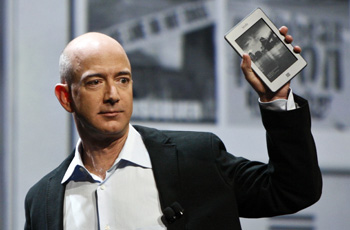 In the world of Tech Goliaths, the seemingly low tech, not for profit Amazon continues to amaze investors with a high and rising stock price. More so than Google, Amazon is considered to have retail all wrapped up with the end game being sky-high warehouses and continuous truck rolls up and down our scenic neighborhoods. Walmart is considered finished, not today but eventually. What if Time Cook has finally come to his senses and decides that the way to make Apple much more valuable is by driving sales through the roof by dropping margins to the floor. It would be un-Steve Jobs like but then again the end game for Apple in terms of valuation is really based on their 30% cut of software sales and the many ads that will flow through iphones, ipads etc…
In the world of Tech Goliaths, the seemingly low tech, not for profit Amazon continues to amaze investors with a high and rising stock price. More so than Google, Amazon is considered to have retail all wrapped up with the end game being sky-high warehouses and continuous truck rolls up and down our scenic neighborhoods. Walmart is considered finished, not today but eventually. What if Time Cook has finally come to his senses and decides that the way to make Apple much more valuable is by driving sales through the roof by dropping margins to the floor. It would be un-Steve Jobs like but then again the end game for Apple in terms of valuation is really based on their 30% cut of software sales and the many ads that will flow through iphones, ipads etc…
Analysts were waiting for Apple to bomb at the last earnings call and in reality there wasn’t a lot to like when one measures them under the old looking glass. Sales were flat and earnings down. However, Apple surprised on the upside on iphone sales and most importantly, itunes sales grew 25% year over year reaching $4B. At current growth rates, iTunes will be a $32B+ business in less than 3 years or nearly ½ a Microsoft without all the R&D.
The iTunes business is not up and down like hardware and more importantly increases in value as Apple’s market share of iOS devices grow relative to Android and Windows. Assuming Apple can unleash a low cost iPhone selling for <$300 and then $200 without a contract, then the relevance of iTunes outweighs the smaller profit margins of hardware – according to the Amazon model. Same goes for the future $249 and then $199 iPADs, which would guarantee iPOD like dominance over the Kindle. See how exciting this gets if Tim Cook invades Jeff Bezos’s backyard. But unlike Bezos, Cook doesn't need ultra high tech warehouses and delivery trucks.
The believability of this argument didn’t come to full realization until the announcement came forth that Apple was going to use Samsung as its Foundry at 14nm. This came just a couple weeks on the heels of TSMC being chosen at 20nm. Why the flip-flop and why is Apple going to go back and work with their #1 competitor in Samsung? My guess is that Apple, through the last 6 months has figured out that the momentum on iOS and the fragmentation of Android, not to mention doubts of future OS versions has led them to believe that it has less to fear from Samsung and it is in their interest to push ahead with much lower cost componentry, Samsung be damned.
There are rumors of Google now making nice with Apple again in order to remain the premiere search and Maps engine on new iOS platforms. This would not be happening if Android were delivering the mobile $$$ that Google expected years ago. The prospect of Apple being able to win 60% of the market for iphones and ipads is already a reality in the corporate world as stated in their conference call. It is here where the Wintel profit empire continues to fund the unsuccessful mobile endeavors that arise from Redmond and Santa Clara. If Apple continues to win this space and move their PC share as well then a retrenchment will occur with Intel favoring the Data Center and Foundry over its client sales. For Microsoft, Office must be preserved at all cost, which could mean greater subservience to MAC OS and iOS. Will Apple get a 30% cut of Office to ensure “iOS compatibility?” Perhaps it will be something a little less severe that ensures embedded spreadsheets on all future platforms?
What we are witnessing is the recreation of the vertical compute model so well executed by IBM in their mainframe heyday of the 1960s and 1970s: a one-stop shop for hardware, OS and applications. In those days, however, they were also the fab when fabs were relatively cheap. Apple is deciding to let the Foundry vendors play a game of musical chairs in order to potentially win 50% or more of the mobile market at each node that is estimated to climb to 5BU a year within a couple of turns of Moore’s Law.
Even though Apple will not attain 95% market share like Microsoft, they will attract the majority of the market that is corporate and e-commerce related. A similar story could be told about how Amazon will not gain a majority of retail as there will always be a significant sized walmart. However in valuations, Amazon on a price to sales basis is nearly 4X higher than the much more profitable Walmart. If, as I suspect, Apple goes for significant hardware revenue growth these next two years, thus winning the mobile OS war and thereby promising years of strong iTunes and applications sales then the analyst community will shift in its attitude towards the company. For the Foundry players and mobile suppliers, this turn will likely mean high growth but much lower margins.







TSMC vs Intel Foundry vs Samsung Foundry 2026